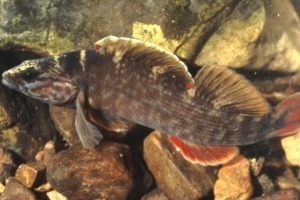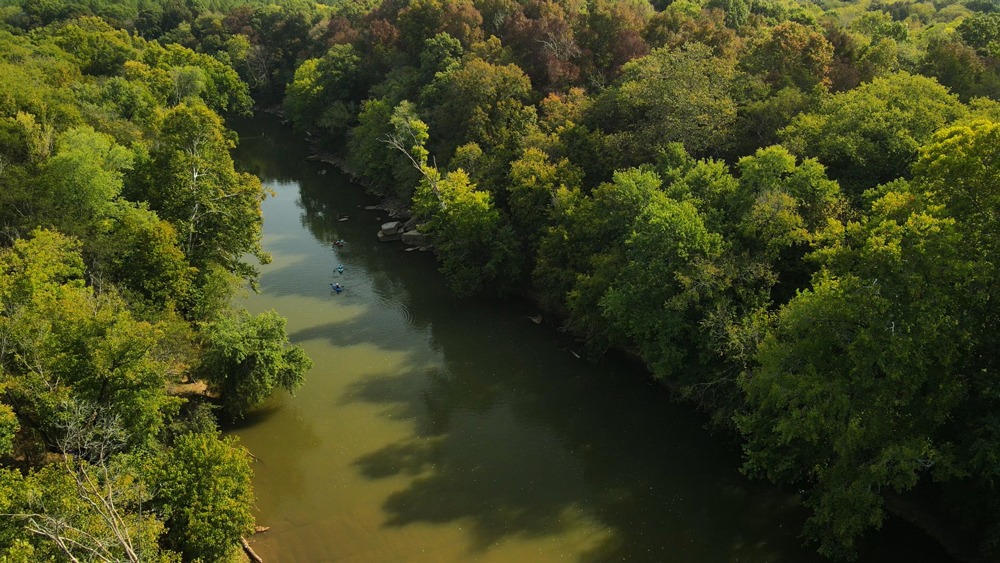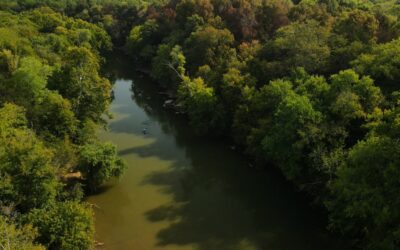Imagine: it’s early fall. The sun is shining. You’re driving west from Middle Tennessee. As you get beyond the cities, you look out the window at the landscape. Trees, a mix of greens and yellows and oranges, are all around. The trees begin to give way to openings with towering stalks of corn and vast fields of soybeans. The land is at its most fruitful—and it brings you a sense of peace.
Hickman County is full of scenes like this.
Despite being just an hour away from Nashville, Hickman county is a rural oasis, filled with farmland and natural areas as far as the eye can see.
And an essential part of that scene is water.
The Duck River and Lick Creek
Flowing east to west across the middle of Hickman County is the most biologically diverse river in North America—the Duck River. Its 284 miles flows through seven Tennessee counties and is home to more than 200 species of fish, mussels, and snails. The Duck River also provides fresh water for 250,000 Middle Tennessee residents and is a key water source for the farmland surrounding it.
With the rapid population growth and expansion of Middle Tennessee cities, the Duck River and its tributaries are facing new challenges. Where it stands now, it appears the choice must be made between the needs of people in the city versus the needs of people in these rural areas.

Lick Creek is an ecologically- and recreationally-significant tributary to the Duck River and is located in east Hickman County. It is classified as an “exceptional Tennessee water” due to the presence of the coppercheek darter, a threatened fish species only found in the Duck River system.
In January 2022, Hickman County residents discovered a plan to build a sewage treatment plant on Lick Creek. The Water Authority of Dickson County proposed the new plant because its current plants in neighboring Dickson and Williamson counties are nearing capacity and will not sustain the projected population growth of those counties.
However, the proposed plant is designed to discharge up to 12 million gallons of wastewater into Lick Creek every day, a creek that naturally only carries around 8 million gallons of natural flow. The sheer energy of this significant increase in water volume and frequency is widely considered a serious threat to the creek’s channel stability and important aquatic habitats. While the wastewater plant would meet federal and state standards for discharge of monitored pollutants, these plants do experience operational failures from time to time. Factor in the unmonitored pollutants, whose effects on the environment are still unknown, and there exist real concerns that wastewater from this proposed plant could have potentially detrimental impacts on wildlife such as the coppercheek darter, agricultural production, and the people of Hickman County who recreate on the river.
A Bigger Issue
This is not the first issue faced by the Duck River in recent years. In 2021, a new water intake facility was planned to be built on the Duck River in Marshall County. The Tennessee Department of Environment and Conservation (TDEC) issued a permit limiting the amount of water the facility could pump out of the river during low water levels. Multiple organizations appealed the permit in an attempt to remove those limitations, but a settlement was reached in May 2022 to keep the limits in place and continue research on the Duck River’s wildlife and habitat.

In addition to the resolved issue in Marshall County and the ongoing conflict in Hickman County, several other water utilities along the Duck River have plans to increase water withdrawals from the river to mediate growing populations. But this is not an isolated issue.
According to TDEC’s Water Quality Monitoring and Assessment Report, less than half of Tennessee’s rivers have been assessed. Of these, 28% are considered impaired, meaning they are polluted or their flow is impacted and they are not supporting their designated uses. As the population continues to grow, the impacts on Tennessee’s water sources could be vast. Since people and cities are not the only ones relying on this water, it’s time for a new approach.
Regional Expansion Needs Regional Planning
Regional growth is good for the economy, but if not done responsibly it will have detrimental impacts on the lands, water, and wildlife that draw many people to Tennessee in the first place. Adjusting to this growth requires planning that takes all voices and potential outcomes into consideration. The fact is, the systems currently in place are not sufficient to conserve our natural resources. It’s time to get creative, think outside the box. Developers, resource managers, conservationists, and community leaders need to work together to come up with innovative solutions that meet the needs of all involved. We cannot view discharge permits or other proposed changes as individual actions, but rather must think about the collective impacts.
The proposed sewage treatment plant in Hickman County won’t solve the uptick in wastewater disposal needs of neighboring counties. It will just pass the problem along to a more rural county and damage an essential resource of that county in the process.
It is not enough to find a quick, temporary fix to a city’s water sourcing or treatment problems. Adding new facilities, water lines, effluent locations, and other measures has impacts beyond that location. The one guaranteed thing is that water does flow, and that means anything put into the water at one spot is going to make its way through the landscape.
Population and infrastructure change over time, and Tennessee’s water resources, and the tools to protect them, will need to continue to change with them. Every action taken today will have impacts down the road. Sustaining these vital resources requires collaborative planning and consistent reevaluation to ensure no waterway is depleted or neglected.
The health and abundance of Tennessee’s waterways is worth taking the time and resources to plan and monitor regularly. The quality of life and economic viability of each region of the state depends on it.




